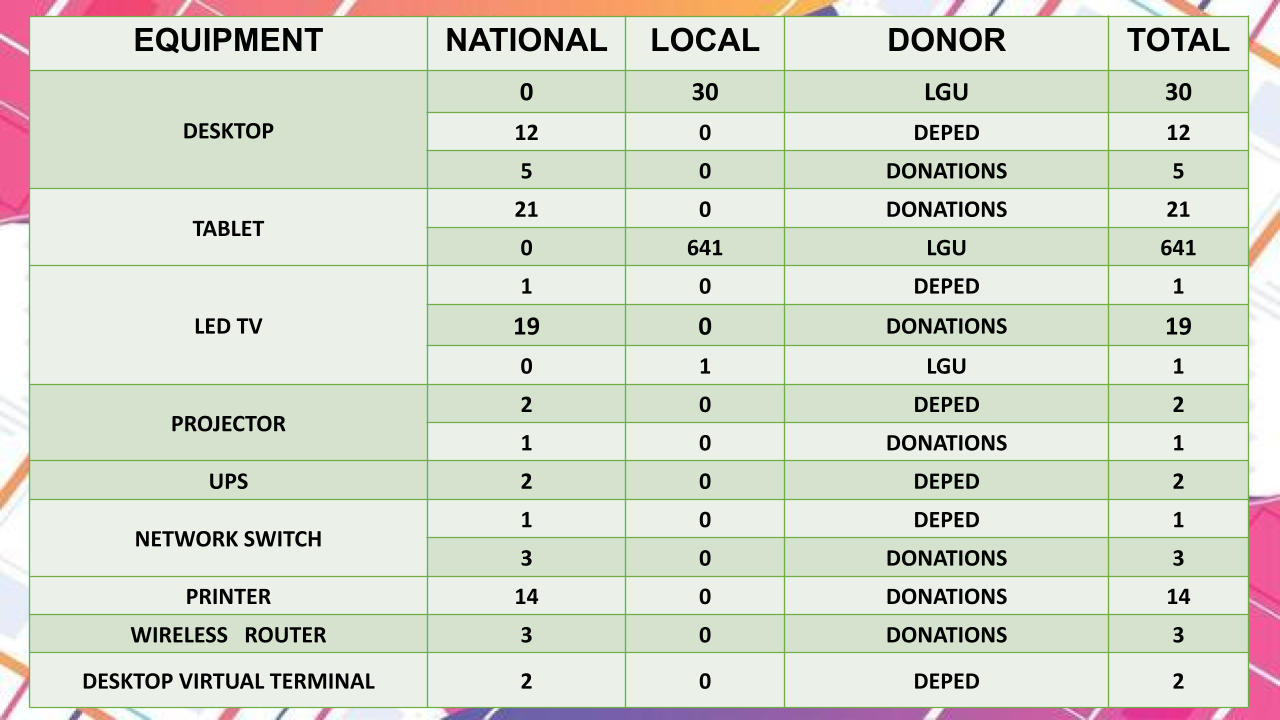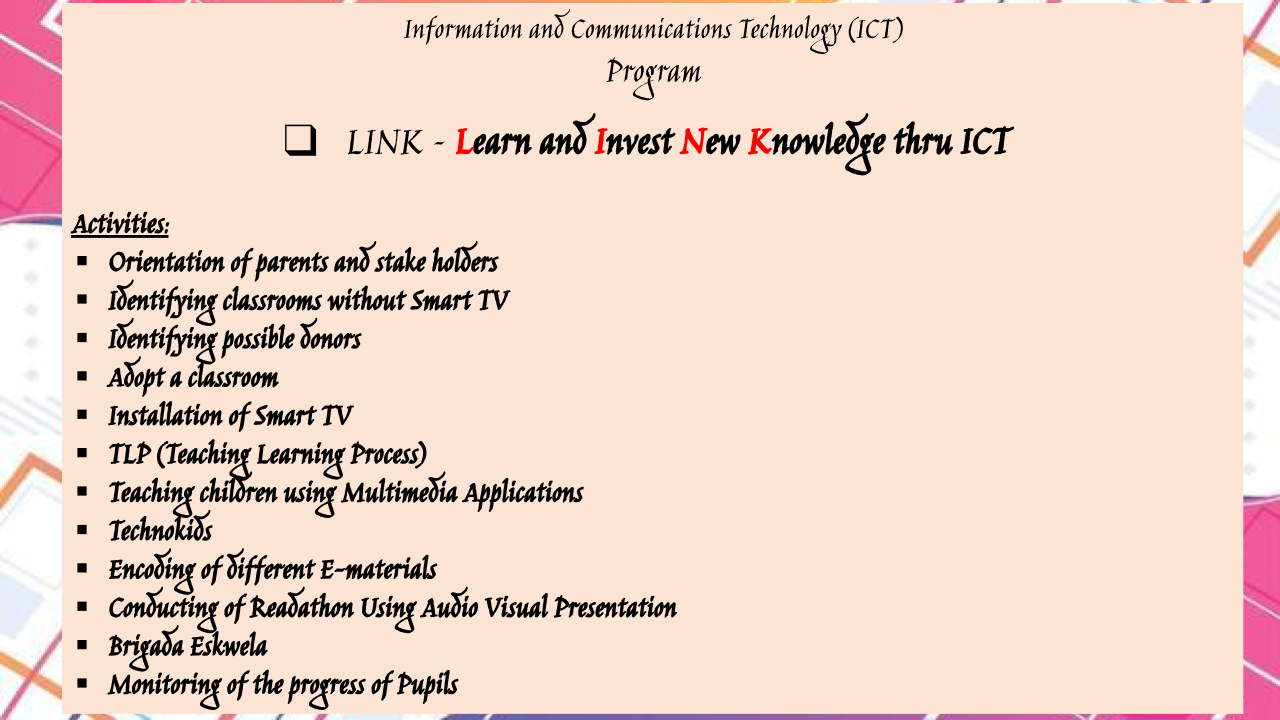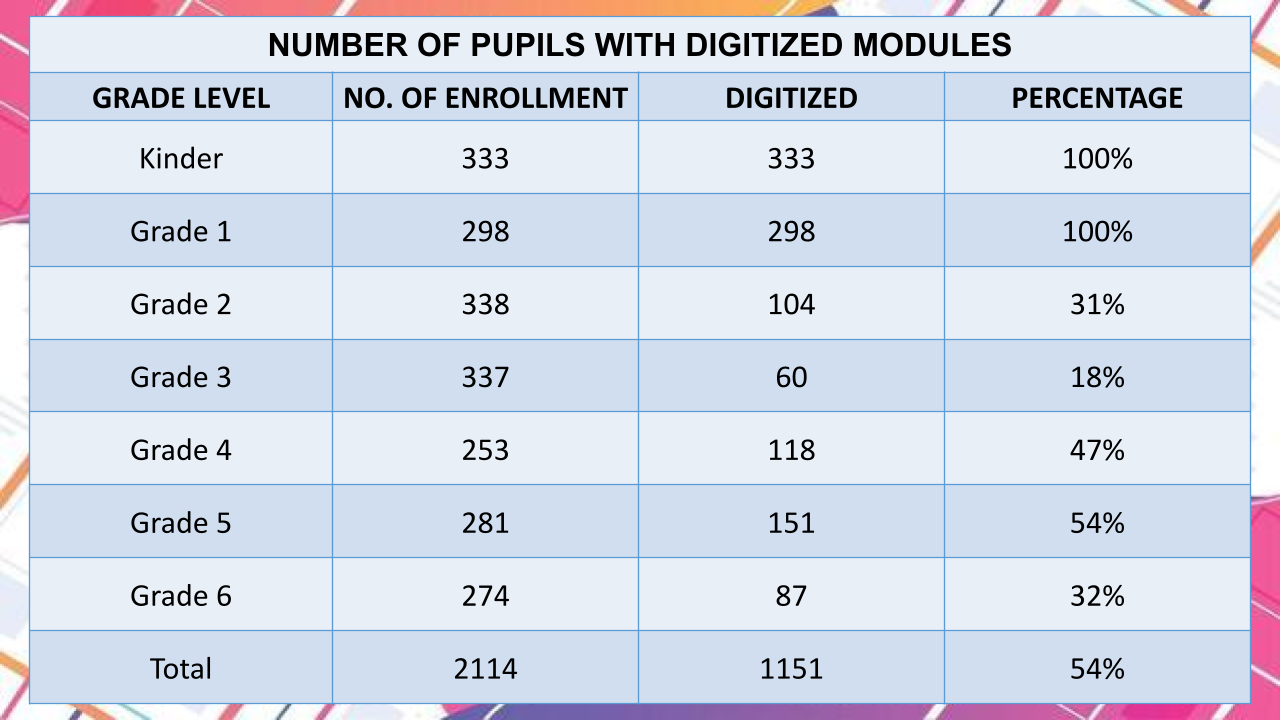K TO 12 BASIC EDUCATION CURRICULUM
ALTERNATIVE LEARNING SYSTEM (ALS)- K TO 12 BASIC EDUCATION PROGRAM
K TO 12 BASIC EDUCATION CURRICULUM
Col. E De Leon Elementary School followed the K to 12 Program in the Philippines was introduced in 2013. It was in 2013 when RA 10533 became a law. This law is known as the “Enhanced Basic Education Act of 2013”. It was popularly called K – 12 because the act, (RA 10533), enhanced the Philippine Basic Education System by strengthening its curriculum and increasing the number of years for basic education.
The enhanced Basic Education Act of 2013 or K-12 as it is commonly known now, provides for a mandatory
- 1 year of Kindergarten,
- 6 years of elementary,
- and Alternative learning system.
The K -12 program applies to public educational institutions.
The Enhanced Basic Education Act of 2013 or RA 10533 did not only lengthen the number of years of Basic Education but also delivered that Basic Education may not only be distributed via regular schools but may correspondingly be delivered through the alternative learning system.
Acceleration of pupils in public Basic Educational Institutions is still acceptable in accordance with the Department of Education rules and regulations.
The exact goal of the K- 12 Program is to produce 21st-century graduates equipped with the core values and lifelong competencies they need to contribute to societal progress and nation-building.
CURRICULUM GUIDE:
Kinder- Kindergarten Curriculum Guide
Grade 1 to Grade 6
Mother Tongue Curriculum Guide
Edukasyon Sa Pagpapakatao Curriculum Guide
- Health Curriculum Guide
- Arts Curriculum Guide
- Physical Education Curriculum Guide
- Alternative Learning System
- LS-1-Comm-Skills-Filipino with als
- LS-1-Comm-Skills-English with als
- LS-2-Scientific-and-Critical-Thinking-Skills with als
- LS-3-Mathematical-and-Problem-Solving-Skills with als
- LS-4-Life-and-Career-Skills with als
- LS-5-Understanding-the-Self-and-Society with als
- LS-6-Digital-Literacy with als
ALTERNATIVE LEARNING SYSTEM (ALS)
ALS Vision:
“Empowerment of the Filipino with desirable knowledge, attitudes, values, and skills that will enable him to think critically and creatively, act innovatively and humanely in improving the quality of his life and that of his family, community and country.”
ALS Mission:
“It is envisioned that with the help of Alternative Learning System (ALS), every Filipino will be awakened, empowered and transformed into a productive, self-reliant, responsible, humane and upright citizen who can contribute to the betterment of the family, community and country. It is also envisaged that ALS will help alleviate poverty and sustain social and economic growth via the development of employable skills and the generation of self-employment.”
ALS Goals and Objective:
To provide viable alternative to the existing formal education instruction, encompassing both non-formal and informal sources of knowledge and skills.
The Alternative Learning System (ALS) is a parallel learning system in the Philippines that provides opportunities for out-of-school youth and adult (OSYA) learners to develop basic and functional literacy skills, and to access equivalent pathways to complete basic education. Many Filipinos do not have a chance to attend and finish formal basic education (Grades 1-6 and Year 1-4) due to many reasons. Some drop out from schools while some do not have schools in their communities. Since every Filipino has a right to free basic education, the Government establishes ALS to provide all Filipinos the chance to have access to and complete basic education in a mode that fits their distinct situations and needs.
Republic Act No. 11510 (Alternative Learning System Act)
Aims to provide adequate, timely, and quality attention and support to the basic learning needs of out-of-school children in special cases and adults including indigenous peoples (IPs). R.A. 11510 aims to hire, capacitate, and develop ALS Teachers, Community ALS Implementers and Learning Facilitators to deliver a range of ALS programs especially in far-flung, unserved, underserved, conflict-affected communities and communities in emergency situations. The ALS program is expanded and strengthened to provide increased opportunities for out-of-school children in special cases and adult learners, including indigenous peoples, to develop basic and functional literacy and life skills, and pursue an equivalent pathway to complete basic education.“ The law guarantees equitable access for all learners, including those who reside in the unreached, underserved, conflict-affected communities, and communities in emergency situations to avail of systematic, flexible, and appropriate alternative basic education programs outside of the formal school system.

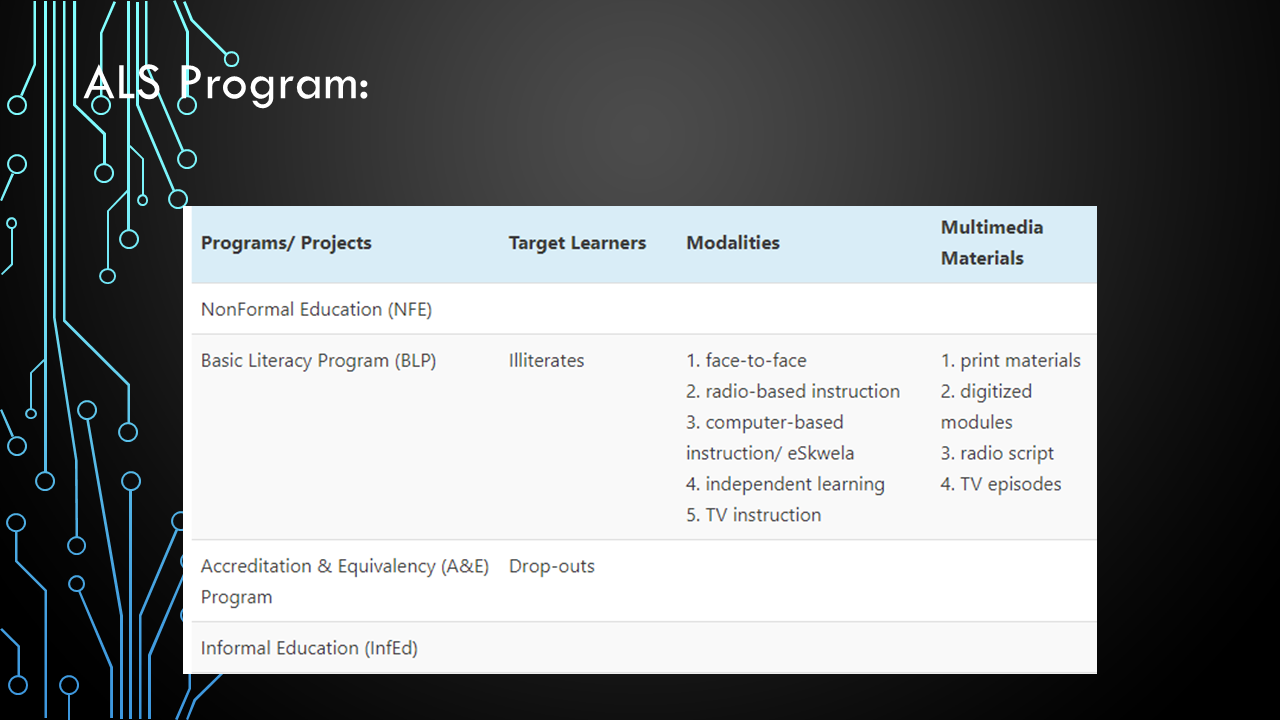




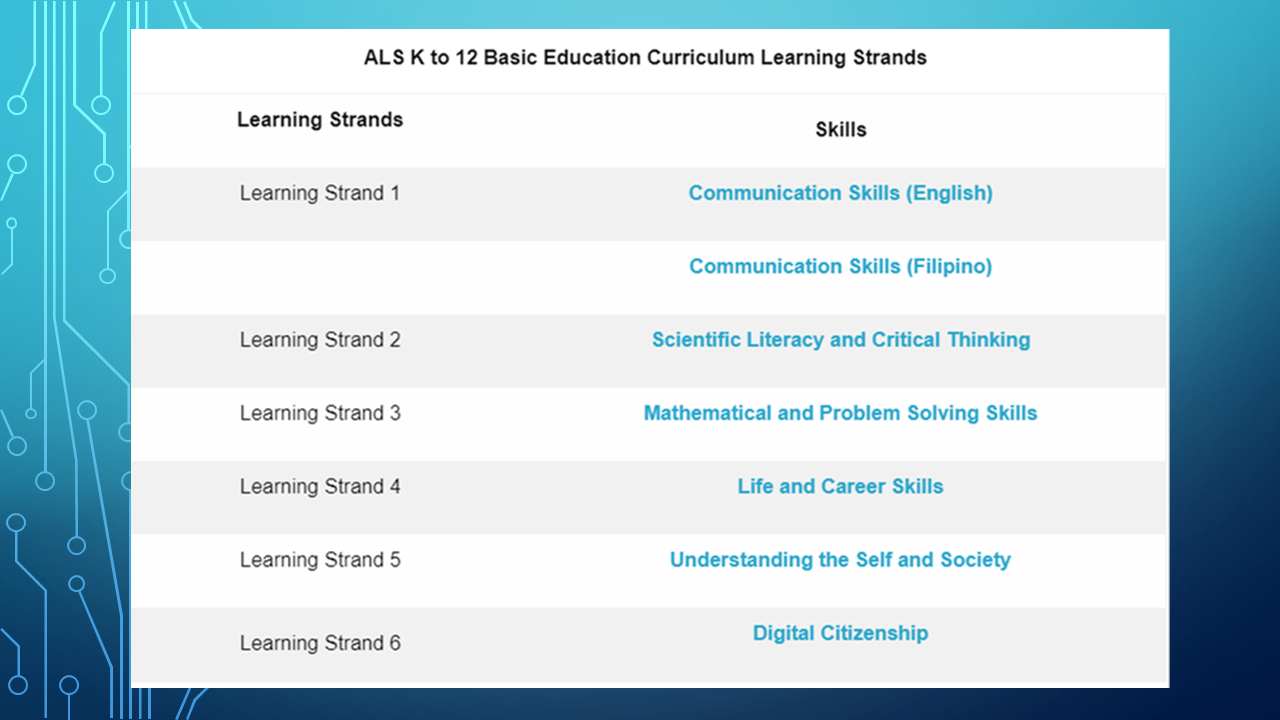











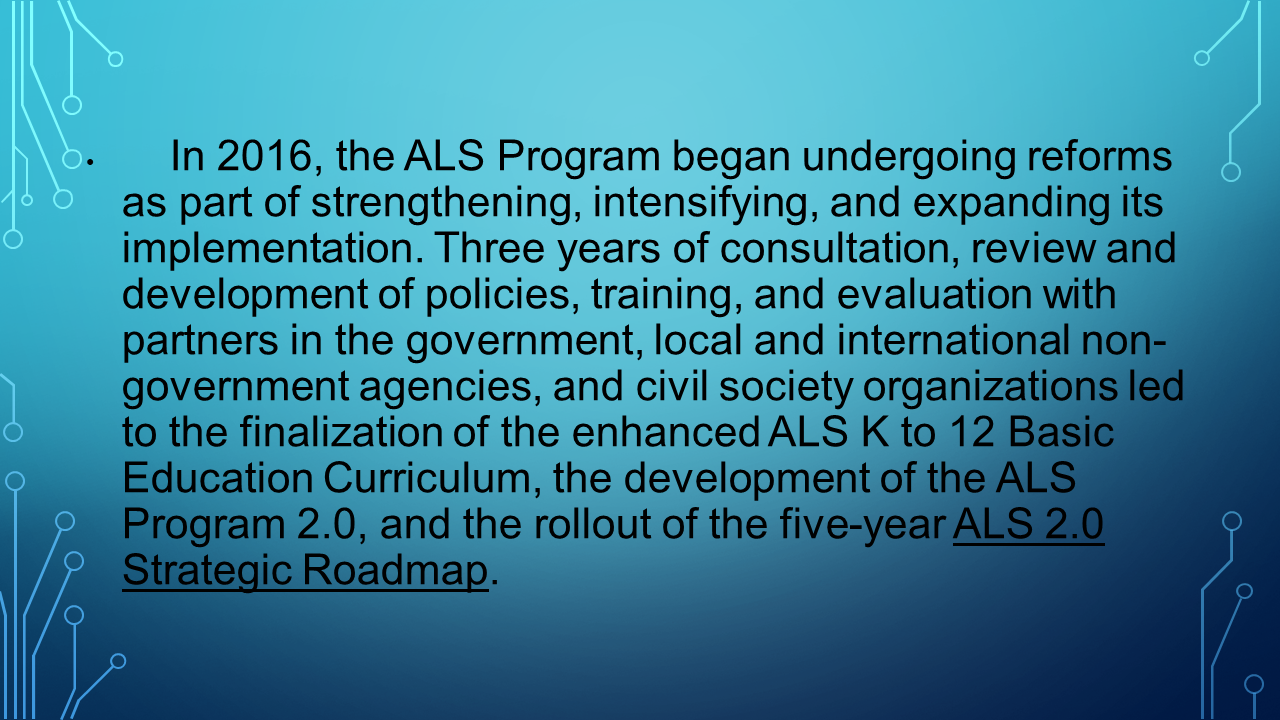
access
HELPS PROMOTE THE WELFARE OF TEACHERS AND LEARNERS
“PROJECT ABAKADA” (Agarang BaliKatin Ang Kaalaman sa tamang Daan para makabasa) -This program aims to iradicate the non-readers and improve the reading ability skills of the pupils. To decrease non-readers and increase the reading proficiency level from frustration to independent by 10% annually.
- PROJECT DRIVE ( Digitization of Reading Instruction and Materials for Vigorous Education)- A Language Literacy program that aims to decrease non-readers and increase the reading proficiency level from frustration to independent.
- Numeracy Program PROJECT I-MATH ( Interactive MAthematics Through Hands on activities) –Aims to decrease the underachievers pupils due to poor study habits and resources specially gadgets on four fundamental operations in their lesson.
- KASALI AKO PROJECT- To improve pupils participation in different online curricular and extra-curricular activities across learning areas.
EarLy Language and Numeracy Assessment ( ELLNA)-The Department of Education (DepEd) Early Language, Literacy and Numeracy Program (ELLN) focuses on capacitating the Kindergarten to Grade 3 teachers and instructional leaders on the basic knowledge and pedagogical skills in literacy and numeracy and in establishing and managing a school-based mentoring/learning.
Project ATTAIN (Assist To Train pupils Aim to Increase their Notion to succeed) –This programs aims to increase the academic performance of pupils per rating period in terms of General Percentage Average (GPA) by 5% annually.
Wellness Program- A year-round program to one fit and healthy.
Brigada Eskwela- aims to bring together all education stakeholders to participate and contribute their time, effort and resources to prepare the school facilities for the opening of classes.
- Feeding Program–aims to reduce or prevent child undernutrition
Mathematics Teachers Association of the Philippines( MTAP)–for Teachers and Learners for teachers to contribute in improving the quality of Mathematics education and for the learners to awaken their greater interest.
LEADERSHIP CLUB
– Supreme Pupil Government ( SPG)-Supreme Pupil Government is a student body. It serves as a venue for elementary pupils to develop their leadership and social skills. Officers of this organization function as leaders in the school. Through concerted efforts, they can achieve their objectives and be able to help the school attain more of its goals.
ACADEMIC CLUBS
- -Science Club, English Club, Math Club, Filipino Club, Journalism-To enhance the academic potentials of the learners.
STEP (Survive Till End with Progress) A program that lessen the number of pupils transferring to other schools.
REHISTRO (REHistradong Indibidwal para Sa isang Tama at Realistikong Oportunidad– Program for pupil’s parents that are illiterate/lacking knowledge on how to register.
LINK (Learn and Invest New Knowledge thru ICT)-Aims To increase the interest of pupils in class interaction.
ELIFE (Enjoyable Learning Institution with a Friendly Environment)-This program aims to fill in the gap from limited to adequate supply of learning facilities and resources in 2021.
EXPLORE (EXtend Pupil’s Learning Outcomes through Realistic Experiences)-A program that increase the number of pupils joining school’s activities.
SHIGLA (Spryness and Health Integration to Grow Learners’ Achievement)-A program that can decrease the number of pupils who do not follow the right amount of food intake and suggested balanced diet in 2021.
PROJECT GURO (Give their Utmost dedication towards work and be Responsible to attain Overwhelming success–To increase proficiency level of teachers towards attaining excellence in teaching and leadership by 2022
National Drug Education Program (NDEP)-The NDEP stands for National Drug Education Program and is a comprehensive educational program which provides for a holistic approach to the problem of drug abuse. It was designed to enable all sectors to work collaboratively, with the school system as the core, thereby, unifying all sectoral endeavors.
Youth for Environment in School’s Organization (YES- O Program) -YES-O is a school-based co-curricular organization which serves as a significant venue for students’ actions and movements toward safeguarding, protecting and conserving the environment for future generations
effeciency
School effectiveness and school improvements to explore the education progress of all the learners regardless of family background and economic status that will serve as the key indicator in their development.(FY 2018-2021)
Pupils Development
Project DRIVE( Digitized Reading Instructions and Materials to deVelop LEarner’s Reading Ability)
To eradicate non-readers and increase the reading proficiency level from frustration to independent.
PROJECT I- MATH
Interactive MAth Through Hands – on activities
Poor study habits because of lack of connection between the teacher and the pupils
PROJECT S.T.E.P. ( Survive Till End with Progress)
Pupils transferred to other school because their houses were demolished.
REHISTRO (REHistradong Indibidwal para Sa isang Tama at Realistikong Oportunidad)
Pupil’s parents are illiterate/lacking knowledge on how to register.
PROJECT ATTAIN (Assist To Train pupils Aim to Increase their Notion to succeed)
to increase the academic performance of pupils per rating period in terms of General Percentage Average (GPA)
PROJECT ELIFE (Enjoyable Learning Institution with a Friendly Environment)
To be able to fill in the gap from limited to adequate supply of learning facilities and resources
Lakbay-Aral Program Project
for A.P teachers and learners to explore historical places around Metro Manila.
PROJECT EXPLORE (EXtend Pupil’s Learning Outcomes through Realistic Experiences)
increase the number of pupils joining school’s activities
Language Literacy
To attain pupils reading levels to instructional and independent
Numeracy Program
Attain increase level of proficiency in Numeracy
KASALI AKO PROGRAM
To improve pupils participation in different online curricular and extra-curricular activities across learning areas
Early Language Literacy and Numeracy Assessment (ELLNA) if allowed under IATF rules \
Increase the level of proficiency of the learners performance
Remediation Prtogram for English, Filipino, Math
Encourage pupils to attain more in these subjects
”PROJECT ABAKADA” (Agarang BAliKatin Ang KAalaman Sa tamang DAan para makabAsa)
Decrease non-readers and increase the reading proficiency level from frustration to independent
PROJECT LINK (Learn and Invest New Knowledge thru ICT )
increase the interest of pupils in class interaction
PERSONNEL DEVELOPMENT
Project G.U.R.O
Give their Utmost dedication towards work and be Responsible to attain Overwhelming success
To increase proficiency level of teachers towards attaining excellence in teaching and leadership
PROJECT “SHIGLA” (Spryness and Health Integration to Grow Learners’ Achievement)
Decrease the number of pupils who do not follow the right amount of food intake and suggested balanced diet
Project BERP (Policy and Research Program (formerly BERF) )
Propagate culture of Research & Development
PROJECT SLAC/School-Based In-Service Training
School-Based Learning Action Cell (SLAC) /In-Set
Learning and Development
Improve the level of teaching proficiency of teachers
E – LIFE (Project Enhancement of the Learning Institution to create a Friendly Environment)
Improve the clean and green, and waste segregation by practicing the 5Rs
Child Protection Policy/Anti-Bullying Policy
Improve school’s environment to make it safe and conducive for learning
School-based Mentoring and Coaching of Master Teachers
PHYSICAL DEVELOPMENT
School Maintenance Services Program
Improve school facilities and learning centers
Brigada Eskwela/Adopt-A-School
Increase stakeholders involvement to support school’s programs and projects
School-Based Management Implementation Program
To improve School-Based Management Implementation Program
PROJECT EXPLORE
Increase stakeholder’s participation in all activities
ICT
Information and Communications Technology (ICT) is the technology essential for information processing, specifically, the use of computers, communication device, and software applications to convert, store, protect, process, transmit, retrieve information from anywhere, anytime.
The development of ICT enables businesses and individuals to communicate and engage in transactions with others electronically, instantaneously, and internationally. This give rise to the formulation of the RA No. 10844 , otherwise known as the “Department of Information and Communications Technology Act of 2015” which was signed into law on 23 May, 2016.
In accordance to the law, the Department of Information and Communications technology (DICT) shall be the primary policy, planning, coordinating, implementing, and administrative entity of the government that will plan, develop and promote the national ICT development agenda.
The education sector is facing many challenges nowadays. We live in a world where changes occur in all sectors. The biggest instance is the COVID 19 pandemic. When face-to-face is prohibited in schools, distance learning evolves and a new model of learning is established. Col. E. De Leon Elementary School supports Modular Distance Learning (MDL) and Digital Modular Distance Learning (DMDL).
CEDLES is very fortunate to receive the ICT equipment from various donors and stakeholders who continuously being generous in providing the needs of every teacher to promote quality basic education during teaching and learning process. The annual School’s Brigada Eskwela Campaign encouraged a number of stakeholders who donated television’s (TV’s), computers, cell phones, tablets, and other gadgets to show their support in this program of the Department of Education.
According to the study of Behnke, Gilliland, Schneider and Singer in 2005, the usage of electronic gadgets like tablets, laptops, and cell phones help a lot of teachers be more equipped and knowledgeable of teaching of teaching methods or strategies concerning technology. Based on the study of Nah, Lim and Yih in 2012, electronic gadgets help facilitate and develop student-centered learning through providing additional functions that enable student’s active role in the classroom.
ICT has become part and parcel of life. Removing it from one’s existence will not be definitely the same again. In this ever-changing world together we hold, let’s embrace the opportunity for a better world for you and me.
